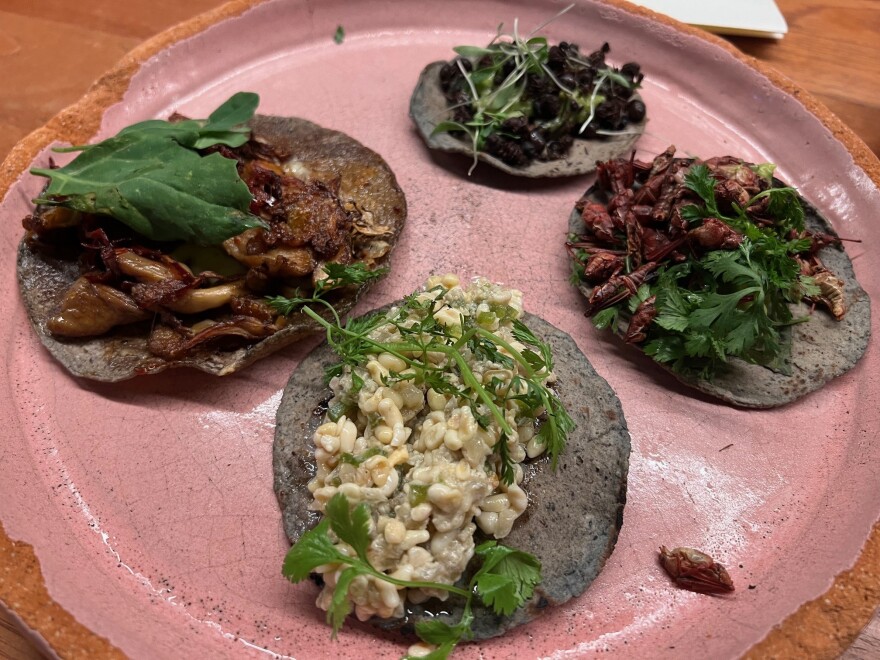In reviews of Mexican restaurants across St. Louis, you’ll find numerous mentions of authenticity. But what makes a Mexican dish, like the taco, truly authentic?
For Ignacio M. Sánchez Prado, that’s the wrong question.
“You never have an authentic taco in front of you because that doesn't exist,” said the Washington University professor and scholar of modern Mexican culture.
In his new book, “Taco,” Sánchez Prado challenges the idea of authentic food by exploring how migration and modernity have shaped the taco from its origins as a working-class staple in Mexico to a transnational icon that comes in many different textures and flavors.
“[A] taco from Seoul Taco doesn't look like a taco in Mexico, so you say it's inauthentic, but those tacos are born out of the vicinity of Koreans and Latinos. Who are we to say that they're not authentic?” he said. “There's an authentic cultural contact between those two cultures.”
Another problem with authenticity, Sánchez Prado added, is how it tries to keep the taco — and more broadly, Mexican culture — rooted in the past.
“Tacos al pastor are a migrant food; they're not an indigenous food,” he said.

As a Mexico City native, Sánchez Prado said he had to “unlearn” his own judgment regarding the way tacos are prepared when he moved to the United States, where hard shell tacos are common.
“I never [saw] a shell until I moved to the U.S. It doesn't exist in Mexico,” he said. “Taco Bell has tried to open in Mexico, and as far as I understand, they have always failed, because that [type of] taco is very alien to people in Mexico.”
Taco Bell notwithstanding, Sánchez Prado enjoys the occasional American-style, hard shell taco. However, his favorite spot to get a taco in St. Louis is El Molino del Sureste, where chef Alex Henry Montes De Oca serves Yucatán-inspired dishes.
“The taco de castacán is a glorious pork belly taco that people should try,” he said. “They're doing great work, but I think the food might be a little bit of a steep hill for some people who are not familiar with the flavors or the cost.”
Restaurants like El Molino del Sureste, Sánchez Prado said, suffer from an economic problem in the U.S., where consumers are accustomed to spending less at Mexican restaurants, compared to French or Italian eateries.
“Mexican food is very complex,” he said, referring to dishes like mole, a beloved staple in Mexico. “[But] a lot of the very complex dishes are not economically feasible for restaurants.”

Sánchez Prado said he hopes his book will encourage people to explore the great diversity of Mexican cuisine — “not just the cheap foods.” By doing so, U.S. consumers may one day be able to experience the more upscale, expensive tacos that are offered in places like Mexico City, where, “instead of being made with industrial tortillas, they are made with heirloom maize by hand [with] ingredients that are ancestral, like grasshoppers or trumpet mushrooms.”
“But the thing is, the taco cuts across class lines. You can find it from the cheapest [stand] outside the subway all the way to the fanciest restaurant,” he said.
To learn more about the taco’s origin story, the great diversity of tacos around the world (including those made in Denmark with Norwegian ingredients like salmon skin), and the significance of writing about Mexican culture at a time of growing prejudice and xenophobia in the U.S., listen to an interview with Ignacio M. Sánchez Prado on Apple Podcasts, Spotify, YouTube or click the play button below.
“St. Louis on the Air” brings you the stories of St. Louis and the people who live, work and create in our region. The show is produced by Miya Norfleet, Emily Woodbury, Danny Wicentowski, Elaine Cha and Alex Heuer. Darrious Varner is our production assistant. The audio engineer is Aaron Doerr.







